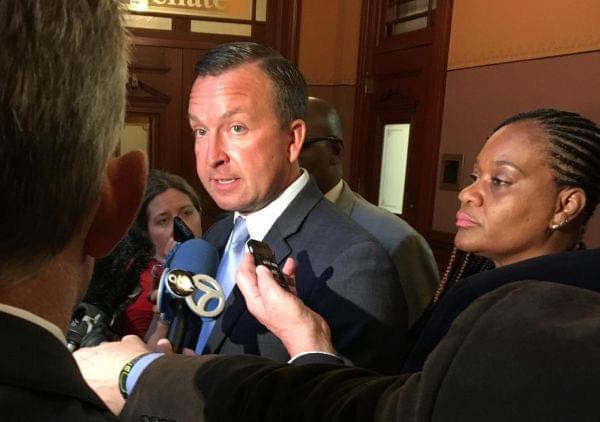Negotiations Fizzle; SB1 Goes To Governor

State Sen. Andy Manar (D-Bunker Hill) addresses a crowd of reporters during what he thought was a temporary break in negotiations on SB1, his school funding reform bill. Dusty Rhodes/NPR Illinois
The future of state funding for Illinois schools is still up in the air Monday afternoon. The fight over Senate Bill 1 — legislation that would overhaul the way Illinois supports k-12 schools — has such high stakes and such slim vote margins that it has turned into a parliamentary chess game. Now, the next move belongs to Gov. Bruce Rauner.
The bill at the center of the controversy is sponsored by State Sen. Andy Manar (D-Bunker Hill), who has made school funding his signature issue. SB1 is his fourth try at replacing the state’s current school funding formula, known as the most inequitable in the nation. State Rep. Will Davis (D-Homewood) sponsored the companion bill in the House.
Unlike previous attempts, SB1 passed both chambers of the General Assembly, though not by veto-proof majorities. Rauner has said he likes 90 percent of the bill, but he soon announced that he planned to use his veto power to amend certain parts of SB1. He has never revealed specifics of the changes he plans to request, but he has been outspoken about his dislike of SB1’s provisions providing help for paying Chicago Public Schools pensions.
CPS is the only school district that pays its own teacher and administrator pensions via the Chicago Teachers Pension Fund. The state’s Teacher Retirement System handles all other teacher pensions. Both CTPF and TRS are severely underfunded (TRS is underfunded by $71 billion). The state’s payment for TRS this year is set to increase by $600 million to a total of $4.6 billion. SB1 would fund CTPF “normal costs” and give CPS credit for the massive payments it owes CTPF.
In hopes of avoiding the veto pen, Democrats used a parliamentary trick to hold the bill, to give Rauner time to cool down and to understand fully what’s at stake. Either overriding or upholding the governor's veto would require a super-majority in each chamber (if Democrats who control the legislature would even call the bill for a veto concurrence vote). Summer further complicates the vote-gathering; regular session ended in May, and legislators have trips and commitments that can’t necessarily be cancelled. But without such a vote, the governor’s partial veto would function as a complete veto, and the bill would die.
On Friday, Rauner asked legislative leaders to appoint members to negotiate a compromise. Eight negotiators — Sen. Jason Barickman (R-Bloomington), Rep. Avery Bourne (R-Raymond), Rep. Barbara Flynn Currie (D-Chicago), Davis, Sen. Kimberly Lightford (D-Maywood), Manar, Sen. Dan McConchie (R-Lake Zurich), and Rep. Bob Pritchard (R-Hinckley) — met for hours by phone on Saturday and in person on Sunday and Monday. Around 2:30 p.m., Manar, Lightford and Davis held an upbeat press conference, saying negotiations were productive and compromise was still possible.
"I think we see progress every step of the way, so I think it's important that the bill not be vetoed by Gov. Rauner. That's one reason why we've held the bill," Manar said.
But less than an hour later, Barickman and Bourne held a press conference to say just the opposite.
"It seemed as if the Democrats in the room were only interested in poking holes in the process, and they had no sincere interest in negotiating in good faith to come to a bipartisan agreement,” Barickman said. “That's very unfortunate."
At that point, Democrats initiated procedures to send the bill to Rauner. By the close of the business day, SB1 was on his desk. Democratic leaders issued statements offering to continue negotiations, and asking Rauner to simply sign the bill into law.
Sources familiar with negotiations said Republicans had requested measures not considered in SB1 such as anti-union reforms, mandate relief, and tax scholarships for private school tuition.
Due to a clause in the state budget, no funds cannot be sent to schools until this issue is resolved.

